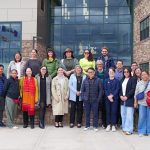Thursday, June 12, 2025
The 2025 immersion Program (27 May to 6 June 2025) was successfully completed on June 6th.
Grandmother Clara Soaring Hawk, Ambassador of the Ramapough Lenape Nation, offered an opening ceremony.
The Program was organized by Columbia’s Institute for the Study of Human Rights (ISHR) and cosponsored by the Center for the Study of Ethnicity and Race (CSER) and the Department of International and Comparative Education at Teachers College. CSER and Teachers College were generous supporting partners from the beginning. Among other things, CSER generously provided its seminar room for our classes at Columbia. The International and Comparative Education Program at Teachers College offered the expertise of Professor Prem Phyak in linguistic human rights and identified two PhD researchers who participated as auditors during the Program.
The Program enjoys the cosponsorship and collaboration of the University of British Columbia in Canada, University of Toronto and the University of Auckland in Aotearoa/New Zealand. Those universities supported three excellent professors who taught several classes: Professor Claire Charters, Professor Andrew Erueti and Professor Sheryl Lightfoot. They also funded three graduate researcher participants. In addition, Professors and instructors from other universities and institutions offered seminars on a variety of topics composing the rich curriculum.
This is an immersion program and participants were expected to devote some seven hours daily to the Program. The course encouraged team learning and synergy by creating a community atmosphere among participants.
There were twenty-six lectures and workshops in a two-week period, including sessions with officials of the St. Regis Mohawk Tribe and others in the community as well as sessions with UN officials. In addition, there were seven participants’ panels. The Program provided 65 hours of lectures, workshops, seminars and related activities. It offered an overview and analysis of the major questions in Indigenous affairs today, as they have emerged globally in the last decades and as they have been put forward by the Indigenous Peoples’ movement, culminating in the adoption of the UN Declaration on the Rights of Indigenous Peoples and efforts towards its implementation.
Participants: After an unprecedented number of applications, some 195, we had 19 participants from 11 countries and 14 Indigenous nations. Participants were mid- to high-level professionals in different fields (academia, civil service, Indigenous authorities, non-governmental organizations, foundations).
Field visit to Akwesasne, St. Regis Mohawk Tribe: The two-day visit was characterized as “life-changing” by many participants in their evaluations. The authorities and other actors in the community opened their doors to us, discussed their issues and shared their visions and actions.
Visit to the UN: Three speakers addressed our group: the Acting Chief of the Secretariat of the UN Permanent Forum on Indigenous Issues; the Senior Policy Adviser, in the Indigenous Peoples and Local Community Engagement of the United Nations Development Program; and the Minister Counselor of the Permanent Mission of Brazil to the United Nations. We also had a special tour of UN Headquarters.
Future of the Program: The Program has taken place at Columbia since 2013. We appreciate and are honored that about 250 people, and their organizations and institutions from around the world, placed their trust in us and joined this Program over the years, strengthening the community for Indigenous Peoples’ rights. We look forward to seeing this Program continue.
Elsa Stamatopoulou
Academic Coordinator of the International Program on Indigenous Peoples’ Rights and Policy, 2013-2025


